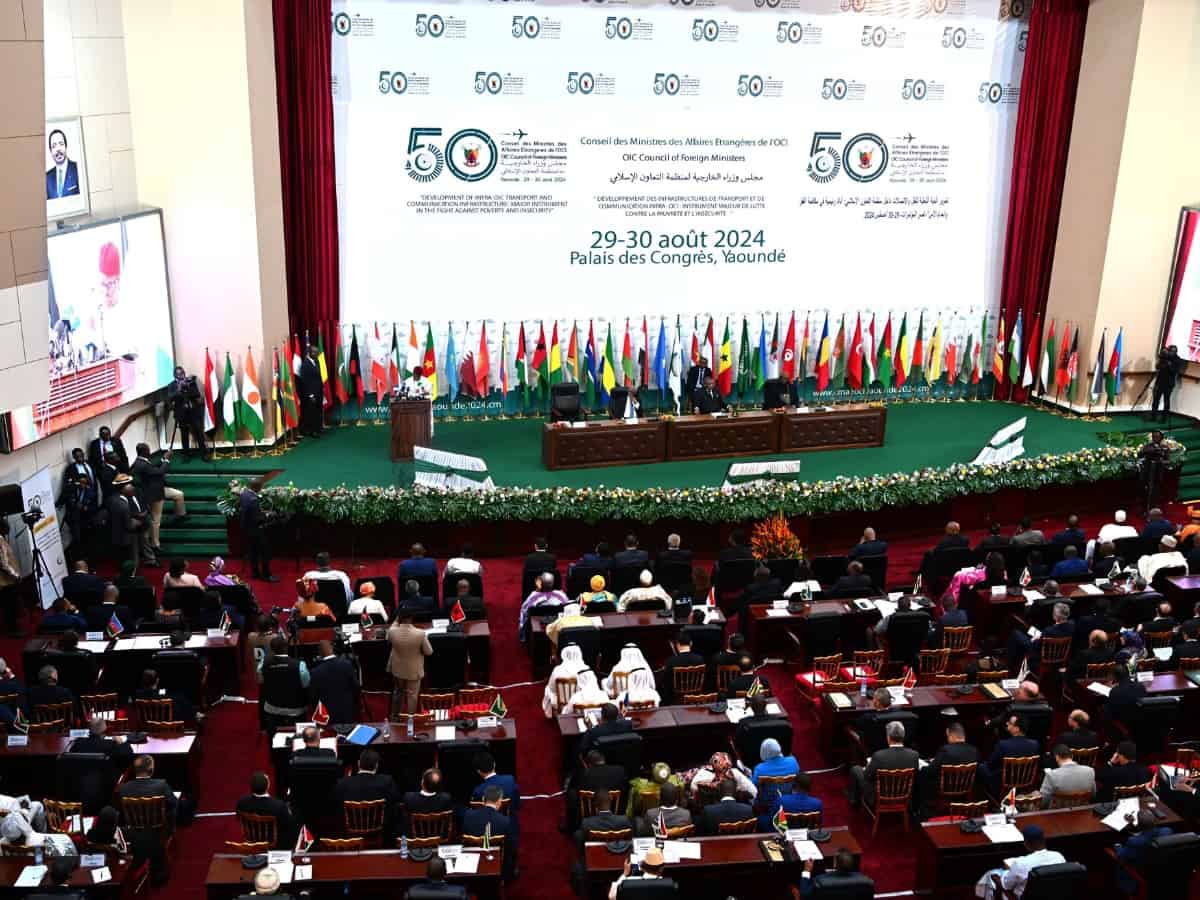
The 50th session of the Organization of Islamic Cooperation (OIC) Council of Foreign Ministers commenced on Thursday, August 30, in the capital, Yaoundé, under the patronage of Republic of Cameroon President Paul Biya.
Cameroon Prime Minister Dr Joseph Dion Ngute inaugurated the session, as reported by the Saudi Press Agency (SPA).
Topics discussed
- The ongoing genocide in war-torn Gaza and the dire humanitarian crisis there
- The aggressive behaviour that Israel has taken in the area that is posing a threat to peace in the Middle East
- Right to self-determination of the people of Jammu & Kashmir
- The imperatives of solidarity and unity of the Ummah
- The rise of Islamophobia and hate speeches in several parts of the world
- Taliban actions such as the ban on girls’ education, women’s work, and their participation in public life
- Accountability for Human Rights violations against the Rohingya.
OIC Secretary-General Hissein Brahim Taha addressed the opening session, stating, “The issue of Palestine and Al-Quds Al-Sharif is witnessing dangerous developments that pose a challenge to the international community in general and the Organization of Islamic Cooperation in particular.”
He highlighted that the Israeli occupation forces are continuing their extensive military aggression against the Gaza Strip and all parts of the Palestinian territories, including the city of Al-Quds Al-Sharif, leading to thousands of casualties.
He affirmed that the OIC is committed to addressing the impact of severe Israeli aggression against the Palestinian people, bolstering their resilience on their land, and defending their legitimate rights.
Taha spoke about the OIC’s efforts to engage in constructive dialogue on various issues in Afghanistan, such as the ban on girls’ education, women’s work, and their participation in public life.
He highlighted the ongoing visits of the OIC secretary-general’s special envoy, Ambassador Tariq Ali Bakhit, and other delegations to Afghanistan to engage in dialogue with the de facto government to end this ban.
Taha also expressed hope for member states’ support for the Humanitarian Fund for Afghanistan at the Islamic Development Bank.
Additionally, he reviewed the developments related to the Jammu and Kashmir issue and the efforts exerted by the OIC and its special envoy, Yousef Al-Doubeay, and his field visits within the framework of implementing the decisions of the Islamic Summit and the resolutions of the council of foreign ministers.
Taha affirmed the OIC’s principled position in support of the territorial integrity of the Republic of Azerbaijan.
He also welcomed the end of the armed conflict between Azerbaijan and the Republic of Armenia and the restoration of Azerbaijan’s sovereignty and territorial integrity within its internationally recognized borders.
Taha affirmed that the OIC pays special attention to the multiple challenges facing the Sahel region and Lake Chad, calling for greater solidarity with their people.
He elaborated that the OIC continues its efforts to prepare for the Donors’ Conference to support the displaced and refugees in the Sahel region and the Lake Chad Basin. The conference is scheduled to be held on October 26 at OIC headquarters in Jeddah.
He stressed the need to keep working to protect the interests of Muslim groups and communities in countries that are not members of the organization.
He also highlighted efforts to combat terrorism, address Islamophobia and religious hatred, and promote dialogue between different faiths and cultures in partnership with other countries.
He noted that Ambassador Mehmet Paçaci, the OIC secretary-general’s special envoy for combating Islamophobia, will soon assume his duties.
During the meeting, a briefing was made on the latest developments regarding the case filed against Myanmar at the International Court of Justice concerning the Rohingya.
OIC Secretary-General, Hissein Brahim Taha, reaffirmed the OIC’s unwavering position in support of the Rohingya, and its continuous calls on Myanmar to ensure their safety and security, recognizing their fundamental rights, including the right to citizenship, and provide favourable conditions for the voluntary, safe, dignified, and sustainable return of Rohingya refugees and IDPs to their homeland.
The Secretary-General emphasized that the OIC will pursue its efforts to mobilize international support for a lasting solution to this complex crisis and to defend the rights and interests of the Rohingya.
On economics, Taha highlighted the significance of opening the OIC’s Labor Centre in Baku, Azerbaijan, to address development challenges related to this sector.
He noted the inaugural session of the General Assembly of the Islamic Halal Accreditation Forum in Makkah in November 2023, aiming to improve understanding and communication among accreditation entities to advance the halal industry.
Concerning climate change and water, Taha confirmed that the OIC is actively seeking opportunities for cooperation among member states in those areas and commended Azerbaijan for hosting the Conference of the Parties to the United Nations Framework Convention on Climate Change (COP-29) in November 2024.
